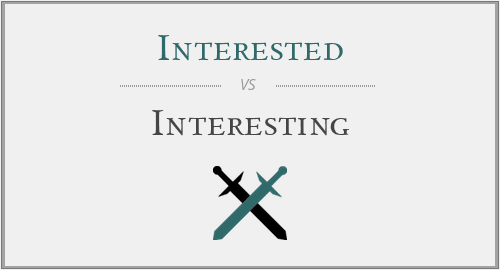Now let’s try to understand when to use which one.
Use interesting to talk about a ‘thing’. Something is interesting. But, you/I/we (people) are interested in something i.e. use interested to talk about someone’s feelings, likes or dislikes.
They are interested in playing soccer.
I am not interested in going to their house.
Interested to vs Interested in
Sometimes, users are tempted to use ‘interested to’. Here is what you need to know before using ‘interested to’. For example, for any activity, always use ‘interested in’ –
CORRECT - I am interested in swimming.
WRONG – I am interested to swim.
CORRECT – Are you interested in taking up this job?
WRONG – Are you interested to take up this job?
CORRECT – They are interested in buying the house.
WRONG – They are interested to buy the house.
However, in some places, both interested to and interested in are correct, for example with verbs of perception like hear, see, think, know, learn etc…
I am interested to know what happened after we went home. OR I am interested in knowing what happened after we went home.
I am very interested to hear more from you in the coming days.
I am interested to see your work.
The interesting day
Day, night, laptop, movie, news, show, English – all of them can be interesting – as simple as that – they are all things.

Even that and this can sound interesting! For example –
“Let’s watch a movie and then I will take you out for dinner”
“This sounds like an interesting proposal!” OR “This sounds interesting!” OR “That sounds quite interesting!”
Here are few examples to make the difference between interesting and interested clearer –
1. “It would be interesting to know if he is working hard.”
“I would be interested to know whether he is working hard.”
2. “She is more interested in politics than music.”
“For her, politics seems more interesting than music.”
3. a. “Mary is an interesting person to talk to.”
b. “Everyone is interested in talking to Mary.”
In 3.a., even though Mary refers to a person, it doesn’t indicate likes/dislikes or feelings of the person. That is why it is correct to use ‘interesting’ here.
In 3.b., though ‘interested’ can be taken in general sense, it could also indicate romantic interest based on the context.
4. “John is interested in playing mobile games.”
“Playing mobile games is quite interesting.”
In sentence 4, notice the difference in the meaning. The second sentence gives a general view about mobile games, while the first one indicates the interest of a specific person.
These two words are commonly confused upon, but have strikingly different meaning unless used in specific contexts like sentence 1 & 2 above. One talks about things, the other about people and their feelings.




Have a discussion about this article with the community:
Report Comment
We're doing our best to make sure our content is useful, accurate and safe.
If by any chance you spot an inappropriate comment while navigating through our website please use this form to let us know, and we'll take care of it shortly.
Attachment
You need to be logged in to favorite.
Log In